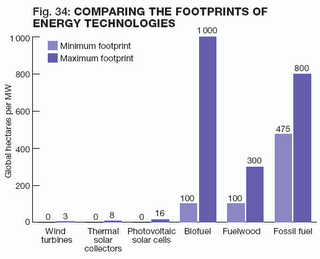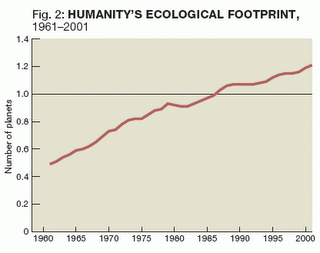Energy Should Not Be Part of Ecological Footprints
The WWF has measured the ecological footprint of humans in their Living Planet Report. I like the concept of the ecological footprint. It is a metric that allows you to determine how much of the earth's productive land and seas are humans using. It lets us know if we are living beyond the earth's capacity, by chopping trees down faster than they can grow, or catching fish quicker than they can replenish. But, I disagree with the way they handle energy use for reasons I explain below. Energy should be its own measurement outside of the ecological footprint. While they report that we are living 20% beyond the carrying capacity of the earth, if you remove the energy footprint then we are well within the carrying capacity of the earth.
The WWF reports that:This demand on nature can be compared with the Earth’s biocapacity, based on its biologically productive area – approximately 11.3 billion global hectares, which is a quarter of the Earth’s surface. The productive area of the biosphere translates into an average of 1.8 global hectares per person in 2001. The remaining three-quarters of the Earth’s surface, including deserts, ice caps, and deep oceans, support comparatively low levels of bioproductivity, too dispersed to be harvested.
Of the 13.5 billion global hectares footprint, food and fiber uses 5.75 (46%), energy: 7.28 (54%) and built up land: 0.44 (3%).
In 2001, humanity’s Ecological Footprint was 13.5 billion global hectares in 2001, or 2.2 global hectares per person. The Ecological Footprint exceeded global biocapacity by 0.4 global hectares per person, or 21 per cent.
The report bases the amount of land that is needed for energy on the CO2 absorbing ability of the land.One global hectare can absorb the CO2 released from consuming 1,450 litres of gasoline per year.
This doesn't make a lot of sense to me, as the extra carbon dioxide is not absorbed by the land. The extra CO2 that you emit just increases the concentration in the air.
It also implies that there is a trade of between how much fossil fuels you can use and the amount of land you use it terms of food and wood. That using one gallon of gasoline has the same impact on your ecological footprint as something like buying a chair made of wood. It implies that if you cut back on your food and wood footprint you can then use more fossil fuels. I don't think that is possible. No amount of fossil fuel usage is sustainable, because we are going to run out.  As this graph shows, there are many different ways to estimate the footprint of energy. If we were to replace fossil fuels with biocrops, then adding it to the footprint would make sense to me. But, the amount of land required for biocrops would probably be about 1/2 that of CO2 sequestering. If we use cellulosic ethanol, we would use land that is currently considered unproductive to create our energy which would have an even smaller impact on the footprint.
As this graph shows, there are many different ways to estimate the footprint of energy. If we were to replace fossil fuels with biocrops, then adding it to the footprint would make sense to me. But, the amount of land required for biocrops would probably be about 1/2 that of CO2 sequestering. If we use cellulosic ethanol, we would use land that is currently considered unproductive to create our energy which would have an even smaller impact on the footprint.
If we base replacing all energy with solar or wind, the amount of land goes away completely. In their analysis they count nuclear power as having a footprint equal to the amount it would have if it were fossil fuels, as they believe nuclear will be replaced with coal or other fossil fuels. But, if you were to use the same logic and say that in the future most fossil fuel energy will be replaced with solar panels on land that is considered biologically unproductive, then the footprint of energy goes down to zero. It is true that fossil fuel usage is not sustainable and needs to be replaced, but should it really count against the carrying capacity of the planet? I don't think so. They calculate our footprint being 20% higher than the carrying capacity of the earth. If you remove energy from the picture, you are left with a footprint of 6.19 billion global hectares which is 54% of the earth's capacity. While you can argue whether or not humans should be able to use 54% of the earth's capacity, you can no longer argue that we are using the earth beyond its carrying capacity.
They calculate our footprint being 20% higher than the carrying capacity of the earth. If you remove energy from the picture, you are left with a footprint of 6.19 billion global hectares which is 54% of the earth's capacity. While you can argue whether or not humans should be able to use 54% of the earth's capacity, you can no longer argue that we are using the earth beyond its carrying capacity.
Even the 54% might be an over estimation. It is a much higher than the intermediate estimate of 19.0% of total net primary production that humans are using in this study. I am not quite sure why the discrepancy, I think it has to do with the footprint looking at acres of land (and only counting 1/4 of earth as being productive), while this study is looking at biomass being created everywhere on earth.
I like the ecofootprint concept, but it doesn't make sense to me to add in energy usage from fossil fuels based on the amount of land that would be required to sequester their carbon dioxide. If you instead assumed fossil fuels will be replaced by solar and wind energy then their impact on the footprint goes down to zero. This is not to say that replacing fossil fuels with alternative energy isn't important, just that it doesn't belong in the the ecological footprint.





No comments:
Post a Comment
Note: Only a member of this blog may post a comment.